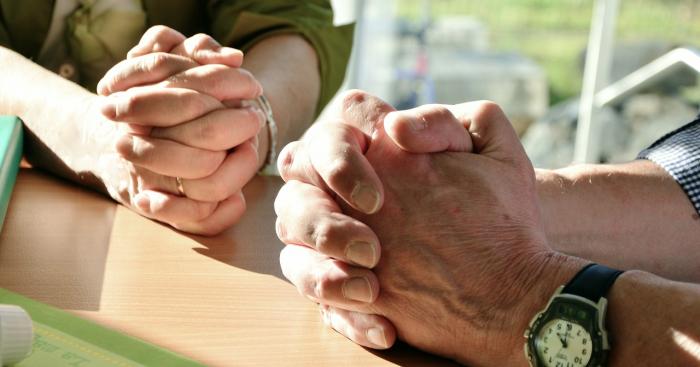
*Note, this is a guest piece by Mark Karris. He is an ordained pastor, licensed marriage and family therapist, speaker, musician, adjunct professor, and all around biophilic. He is the author of Season of Heartbreak: Healing for the Heart, Brain, and Soul (Kregel, 2017). He and his family live in San Diego, California. Visit him at ConspiringPrayer.com.
Many of you won’t know me, so let me introduce myself. I am a therapist, ordained pastor, husband, father, adjunct professor, and the author of the newly released, Divine Echoes: Reconciling Prayer with the Uncontrolling Love of God. My book is divided into three sections: Investigation, Deconstruction, and Reconstruction. The focus of my book is on a specific type of prayer, petitionary prayer to be exact. Allow me to skip to the Deconstruction section and offer four reasons why petitionary prayer is ineffective, harmful, and makes a good God look really bad. First, let me define petitionary prayer.
Petitionary prayer is a specific form of prayer aimed at making requests of God. They make requests of God for answers to life’s questions and concerns. They are also pleas for God to be the sole responsible agent to act on behalf of the one who is praying. Petitionary prayers can be offered on a small and personal scale for oneself or for others, or they may involve requests on a larger scale that concern changing undesirable circumstances within society or, indeed, the world as a whole.
While there are petitionary prayers that ask God to continue the wonderful work that he is already doing, I define the traditional understanding of the typical petitionary prayer as talking to God and asking God to love in a specific manner in which God was not doing so beforehand.
We have all heard such petitionary prayers:
- “God, pour out your love on aunt Mary. Please save her.”
- “God, root out the hatred, prejudice, and bigotry in our country.”
- “God, give the doctors wisdom.”
- “God, give my dad traveling mercies as he travels across state tomorrow.”
Such beautiful pleas come from sincere hearts desperately praying for God to intervene in the lives of those they love. But does petitionary prayer offered on behalf of another effect any real change? Or, are they ineffective, doing nothing but distort the loving character of God and ultimately make matters worse? I have to lean toward the latter. Let me share four reasons why.
-
God is Portrayed as Unloving
A Christian relative praying anxiously, “God pour out your love on Aunt Mary. Please save her,” is based on an assumption that God is not already loving and seeking to save aunt Mary. The person praying is unknowingly praying prayers that are not in alignment with the reality of the profound goodness of God. God has always loved aunt Mary and is presently loving her, even while her relative is praying. God is also seeking to save aunt Mary—mind, body, and spirit. God wants “all people to be saved and to come to the knowledge of the truth” (1 Timothy 2:4). A person does not need to twist God’s arm or talk him into doing what automatically flows out of God’s nature and character. Is God good some of the time or all of the time?
Praying for God to love, heal, and be gracious to loved ones suggests that God is not loving, healing, and being gracious to them. It’s like asking a world-renowned heart surgeon, known for her skill and compassion, who was in the middle of performing perfect heart surgery on your family member, “Can you perform the surgery with skill, professionalism, wisdom, and care?” Many petitionary prayers question God’s goodness without realizing it.
A Christian who prays, “God, please don’t hate me,” is praying a theologically incorrect prayer because a God of love cannot hate us (John 3:16). Such a prayer doubts the goodness of God.
A struggling Christian who fears God’s punishment and prays, “God, please don’t pour out your wrath on me,” also prays a prayer that is contrary to God’s loving nature (1 Thessalonians 5:9). The same can be said of a Christian who prays, “God, grant my dad traveling mercies,” as though God must be petitioned to protect his children from danger. The implication of such a prayer is that God may allow any Christian who doesn’t pray for traveling mercies to be harmed on the road due to lack of prayer. Really? Is that what a loving God would do? Likewise, a Christian who prays, “God, pour out your love and save my aunt Mary,” as though God is withholding his love from her and intentionally choosing not to save her, is praying in a manner that is theologically contradictory to God’s loving nature and perfect will.
-
God is Portrayed as Passive and Cruel
The common Christian belief is that God could increase his active love in the world and maximize the good in people’s lives. But, he chooses not to because other people did not make a choice to pray for these people. God, the very definition of love, allows people to become sick, to miss rent payments, to remain unregenerate, to be raped or murdered just because other people did not pray for them to get well, have rent money, become saved, or stay safe. Such logic distorts God’s image into one of passiveness and even cruelty; God becomes a bystander who simply watches people suffer while doing nothing to alleviate the evil in their lives, despite having the power to do so.
Atheistic philosopher Georges Rey adds his voice to those who are uneasy about a God who allows people to suffer because other people are not praying for them. He writes:
“The idea of an omni-god that would permit, for example, children to die slowly of leukemia is already pretty puzzling; but to permit this to happen unless someone prays to Him to prevent it—this verges on a certain sort of sadism and moral incoherence (imagine a doctor who acted in this way!), and one wonders what people have in mind in worshipping Him.”
Georges Rey and other deep-thinking theologians and philosophers who share his concerns have a valid point. There is a moral incoherence and inherent contradiction in the idea that God requires petitionary prayer before he increases his loving action in the world to stop evil. A God who can intervene and stop evil in its tracks but chooses when and where not to do so is logically and morally incomprehensible.
What would we think of a man watching a child being sexually assaulted, who has the power to do something about it but chooses not to because no one asked him? The Spirit of love and justice within us would rise up and object that such a man was unjust and immoral. This same Spirit would also rise up against a view of God as someone with full ability to intervene in horrific events but who simply chooses not to.
-
Science Doesn’t Prove It is Effective
The scientific evidence does not demonstrably prove that praying on behalf of others is effective. And, there have been a lot of studies trying to prove its effectiveness. I will just share one study.
One of the largest and most expensive studies of intercessory prayer to date, costing $2.4 million, was carried out by Harvard researchers and supported by the Templeton Foundation. The study examined the therapeutic effects of intercessory prayer on patients recovering from coronary artery bypass graft (CABG) surgery. The patients were randomly placed into three different groups. The members of two of the groups were told that they may or may not receive intercessory prayer, though only one of those two groups were actually to receive it. A third group was told they would receive prayer. Christians and Catholic intercessors prayed for fourteen days for the participants who were designated to receive prayer. The researchers came away with two main conclusions:
First, intercessory prayer itself had no effect on whether complications occurred after CABG. Second, patients who were certain intercessors would pray for them had a higher rate of complications than patients who were uncertain but did receive intercessory prayer.
Many declared the study a $2.4 million failure. The critics and media had a field day. Newsweek titled one of its stories “Don’t Pray for Me! Please!” The point is, from a scientific perspective, praying on behalf of others doesn’t really make a difference.
-
It Contributes to Evil and Suffering in the World
Every 10 seconds, a child dies from hunger.
Every 98 seconds another American is sexually assaulted
Every 33.5 minutes, someone is murdered.
Every, 20 seconds, a burglary occurs.
Over 52,000 will die from drug overdoses this year
On a single night in January 2015, 564,708 people experienced homelessness.
Systemic injustice, suffering, and evil do not prove that petitionary prayer for others is ineffective, so what is their relevance here? For me, these statistics are evidence that the stakes are too high to ignore. We cannot afford to spend our time engaging in immature forms of petitionary prayer and superstitious practices. We cannot engage in spiritual activities that cause us to feel good, thinking we are accomplishing great things, but ultimately do not achieve the good they set out to accomplish. Or worse, they contribute to the evil and suffering in the world.
If people believe that praying to God in a certain manner, at a certain volume, and with certain words will convince God to single-handedly root out prejudice, reduce hate crimes, solve the problem of homelessness, heal drug addicts, stop people from committing arson, stop rapes from occurring, and so on, they are engaging in magical thinking and superstition of the worst kind.
Petitionary prayers can become an ironic gesture. Their intent may be to increase God’s loving activity and shalom in the world. But a problem arises when we pass the responsibility of shalom solely to God (“God, you fix the problem!”). We thereby avoid God’s primary method of achieving shalom; humans, filled and led by the Spirit of God, fulfilling their vocation as God’s empowered emissaries.
In New York City, a congregation had gathered for a prayer meeting. A winter storm was expected the following day, so they took time to pray for a group of homeless people who frequented an area not too far from the church: “God, pour out your love on the homeless people downtown. Help them find shelter. Protect them from the cold and from illness. Show them the salvation of your dear Son, Jesus Christ.”
Perhaps those church members were the ones who needed to be saved from the pitfalls of petitionary prayer. They may have meant well, but their prayers indicated a belief that talking to God would absolve them of any responsibility to do something about the problem by placing all responsibility for resolving it upon God. Ironically, instead of being beneficial, their prayers became an obstacle to God being able to use that congregation as his Spirit-led and empowered emissaries to love, help, and save those homeless people. God is not the one who needs to be coaxed, persuaded, or reminded in any way to love the homeless. God longs for them to be holistically saved. God grieves that some will suffer in the freezing cold. If prayer in its simplest form is an act of talking, then perhaps God whispered to that congregation: “Church, pour out your love on the homeless people downtown. Help them to find shelter. Protect them from the cold and from illness. Show them the salvation of my dear Son, Jesus.”
Conclusion
Okay, you may think I hate prayer. I actually don’t. I love God. I love the Church. And, I am a big fan of prayer, especially seen through the lens of God’s uncontrolling love. You are just getting some snapshots of the type of content found in the Deconstruction section of Divine Echoes. To find out more about my attempt to investigate, deconstruct, and reconstruct petitionary prayer, pick up the book. You may be surprised at what you find. As theologian Thomas Oord has said about my book, “His proposals may shock you, but good medicine can sometimes do that.”
References
Georges Rey, “Meta-atheism: Religious Avowal as Self-Deception,” in Philosophers without Gods: Meditations on Atheism and the Secular Life, ed. Louise M. Anthony (Oxford: Oxford University Press, 2007), 261.
Herbert Benson, Jeffery A. Dusek, Jane B. Sherwood, Peter Lam, Charles F. Bethea, William Carpenter, Patricia L Hibberd, et al., “Study of the Therapeutic Effects of Intercessory Prayer (STEP) in Cardiac Bypass Patients: A Multicenter Randomized Trial of Uncertainty and Certainty of Receiving Intercessory Prayer,” American Heart Journal 151 (2006): 934–42.













